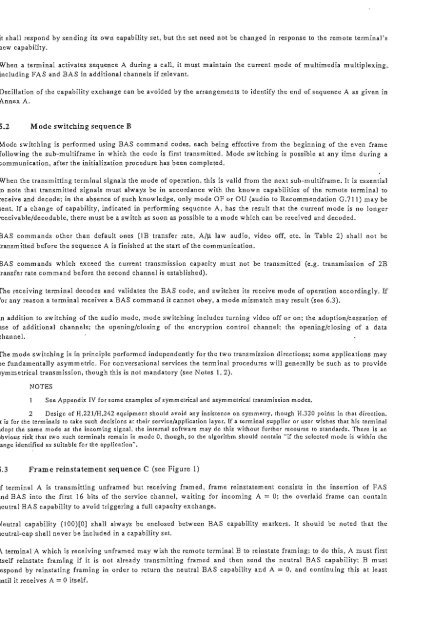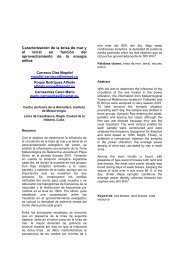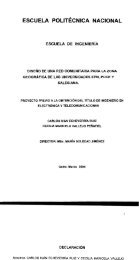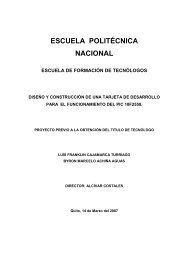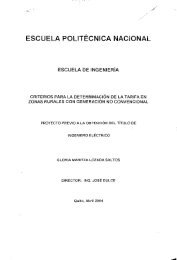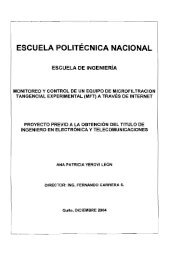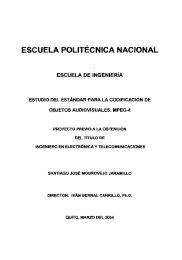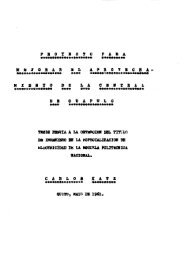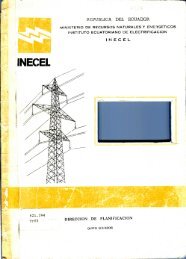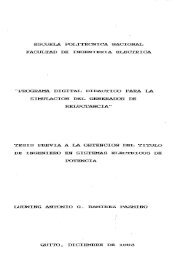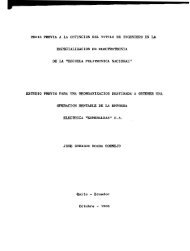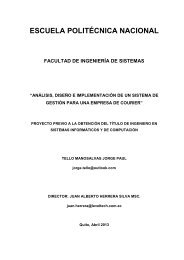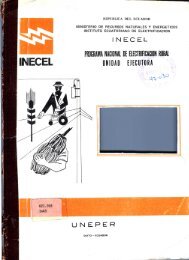Tesis previa a la obtención del Título de Ingeniero en Electrónica y ...
Tesis previa a la obtención del Título de Ingeniero en Electrónica y ...
Tesis previa a la obtención del Título de Ingeniero en Electrónica y ...
You also want an ePaper? Increase the reach of your titles
YUMPU automatically turns print PDFs into web optimized ePapers that Google loves.
it shall respond by s<strong>en</strong>ding its own capability set, but the set need not be changed in response to the remote terminal's<br />
iew capability.<br />
ÍVh<strong>en</strong> a terminal activates sequ<strong>en</strong>ce A during a cali, it must maintain the curr<strong>en</strong>t mo<strong>de</strong> of multimedia multiplexing,<br />
¡ncluding FAS and BAS ín additional channels if relevant.<br />
Dscil<strong>la</strong>tion of the capability exchange can be avoi<strong>de</strong>d by the arrangem<strong>en</strong>ts to i<strong>de</strong>ntify the <strong>en</strong>d of sequ<strong>en</strong>ce A as giv<strong>en</strong> in<br />
Annex A.<br />
5.2 Mo<strong>de</strong> switching sequ<strong>en</strong>ce B<br />
Mo<strong>de</strong> switching is performed using BAS command co<strong>de</strong>s, each being effective from the begínning of the ev<strong>en</strong> frame<br />
following the sub-multiframe in which the co<strong>de</strong> is first transmitted. Mo<strong>de</strong> switching is possible at any time during a<br />
iommunication, after the initialization procedure has be<strong>en</strong> completed.<br />
Wh<strong>en</strong> the transmitting terminal signáis the mo<strong>de</strong> of operation, this is valid from the next sub-multiframe. It is ess<strong>en</strong>tial<br />
:o note that transmitted signáis must always be in accordance with the known capabilhies of the remote terminal to<br />
receive and <strong>de</strong>co<strong>de</strong>; in the abs<strong>en</strong>ce of such knowledge, only mo<strong>de</strong> OF or OU (audio to Recomm<strong>en</strong>dation G.711) may be<br />
¡<strong>en</strong>t. If a change of capability, indicated in performing sequ<strong>en</strong>ce A, has the result that the curr<strong>en</strong>í mo<strong>de</strong> is no longer<br />
•eceivable/<strong>de</strong>codable, there must be a swltch as soon as possible to a mo<strong>de</strong> which can be received and <strong>de</strong>co<strong>de</strong>d.<br />
3AS commands other than <strong>de</strong>fault ones (IB transfer rate, A/JI <strong>la</strong>w audio, vi<strong>de</strong>o off, etc. in Table 2) shall not be<br />
;ransmitted before the sequ<strong>en</strong>ce A is finished at the start of the communication.<br />
BAS commands whích exceed the curr<strong>en</strong>t transmission capacity must not be transmitted (e.g. transmission of 2B<br />
;ransfer rate command before the second channel is established).<br />
rhe receiving terminal <strong>de</strong>co<strong>de</strong>s and valídales the BAS co<strong>de</strong>, and switches its receive mo<strong>de</strong> of operation accordingly. If<br />
for any reason a terminal receives a BAS command it cannot obey, a mo<strong>de</strong> mísmatch may result (see 6.3).<br />
ji addition to switching of the audio mo<strong>de</strong>, mo<strong>de</strong> switching inclu<strong>de</strong>s turning vi<strong>de</strong>o off or on; the adoption/cessaüon of<br />
ise of additional channels; the op<strong>en</strong>ing/closing of the <strong>en</strong>cryption control channel; the op<strong>en</strong>ing/closing of a data<br />
¡hannel.<br />
rhe mo<strong>de</strong> switching is in principie performed in<strong>de</strong>p<strong>en</strong><strong>de</strong>níly for the two transmission directions; some applications may<br />
)e fundam<strong>en</strong>tal!y asymmetric. For conversational servíces the terminal procedures will g<strong>en</strong>erally be such as to proví<strong>de</strong><br />
lymmetrical transmission, though this is not mandatory (see Notes 1, 2).<br />
NOTES<br />
1 See App<strong>en</strong>dix IV for some examples of symmetrical and asymmetrical transmission mo<strong>de</strong>s.<br />
2 Desígn of H.221/H.242 equipm<strong>en</strong>t should avoíd any ¡nsist<strong>en</strong>ce on symmetry, though H.320 poirits in that direction.<br />
t is for the termináis to talce such <strong>de</strong>císíons at theír servíce/application <strong>la</strong>yer. If a terminal supplier or user wíshes that his terminal<br />
idopt the same mo<strong>de</strong> as the incoming signal, the interna! software may do this without further recourse to standards, There is an<br />
ibvious risk that two such termináis remain in mo<strong>de</strong> O, though, so the algorithm should contaín "if the selected mo<strong>de</strong> is within the<br />
ange i<strong>de</strong>ntified as suítable for the applicatíon".<br />
¡.3 Frame reinstatem<strong>en</strong>t sequ<strong>en</strong>ce C (see Figure 1)<br />
f terminal A is transmilting unframed but receiving framed, frame reinstatem<strong>en</strong>t consists in the insertion of FAS<br />
,nd BAS into the first 16 bits of the service channel, waiting for incoming A = 0; the over<strong>la</strong>id frame can contain<br />
icutral BAS capability to avoid triggering a full capacity exchange.<br />
í cutral capability (100)[0] shall always be <strong>en</strong>closed betwe<strong>en</strong> BAS capability markers. It should be noted that the<br />
leutral-cap shall never be inclu<strong>de</strong>d in a capability set.<br />
^ terminal A which ís receiving unframed may wish the remote terminal B to reinstale framing: to do this, A must first<br />
tself reinstale framing if it is not already transmitting framed and th<strong>en</strong> s<strong>en</strong>d the neutral BAS capability; B must<br />
espond by reinstatíng framing in or<strong>de</strong>r to return the neutral BAS capability and A = O, and continuíng this at íeast<br />
intil it receives A = O itself.


